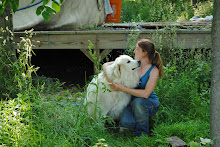
The difference is first and foremost our 5 cows--Lucy, Lukey, Leche, Maya, and Chloe. All winter long, our cows spent their nights in the barn, leaving us with an abundance of rich manure ideally situated for convenient composting. As soon as the snow melted and the pastures became knee-deep in fresh grass and covercrops, our bovine beasties began chafing for fresh greens (who can blame them?). Last week, we pulled out the mobile electric fencing and led our eager cows onto the first of 3 field of rye grass. These fields will lie fallow this year, allowing the earth to rest before another strenuous year of growing. Fallow fields are not
 devoid of activity, however. The rye grass added nitrogen to the soil, and like all grasses, sent down deep, aerating roots. Now that our cows have mowed the grass, we can reseed the fields in a summer crop like oats, which will be fertilized by the cow's manure.
devoid of activity, however. The rye grass added nitrogen to the soil, and like all grasses, sent down deep, aerating roots. Now that our cows have mowed the grass, we can reseed the fields in a summer crop like oats, which will be fertilized by the cow's manure.But that manure needs spreading, which is why we have our chickens. Our 83 Golden Star laying hens have finished their winter vacation in the barn and are now hard at work cleaning up after the cows. Truth be told, they're much happier (and thus more pleasant to work with) now that they can take dust baths, catch bugs, and run in circles around their pen.
 Every day one of us moves their covered wagon-esque shelter one length farther in the cow-grazed field. After about a week, we'll move their fencing to a new patch and begin again. All the while that they are scratching through cow patties and scruffing up the soil, the chickens are adding their own fertilizer, which will show up in bright green growth in our next covercrop.
Every day one of us moves their covered wagon-esque shelter one length farther in the cow-grazed field. After about a week, we'll move their fencing to a new patch and begin again. All the while that they are scratching through cow patties and scruffing up the soil, the chickens are adding their own fertilizer, which will show up in bright green growth in our next covercrop.Meanwhile, back at the barn, the pigs are turning the cow's winter manure (and shortly the chicken's too) into compost. Pigs love nothing better than rooting for buried treasure, so we hide pockets of dried corn deep in the bedding and manure. The pigs dig it up, grow happily fatter, and move our composting operation along at a brisk pace. Our compost piles then age in the sun for about a season, until what once was waste becomes farm gold.
Through the additional labor of millions of earthworms, trillions of bacteria, nematodes, and fungi, our land becomes something more than a medium for growing plants.
It is soil, not dirt.




No comments:
Post a Comment